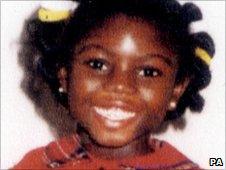Government orders review of child protection in England
- Published

Successful child protection systems abroad will be examined
An independent review of child protection and social work in England has been ordered by the government.
Prof Eileen Munro, from the London School of Economics, will examine ways of cutting bureaucracy to give social workers more time with children.
She will also consider ways of improving links between social workers and other agencies like the police.
The review has been prompted by several high-profile abuse cases, including the death of Baby Peter in 2007.
Prof Munro said: "The way the system has evolved has been so focused on improving the procedures and the guidance that it's accidentally undermined the importance of the social work skill."
She told BBC Radio 4's Today programme that the amount of paperwork in the job had "mushroomed out of control" and "doing things by the book was not enough".
"It's about social workers going into family homes and being able to talk to children, being able to deal with aggressive parents and the organisation supporting them in that difficult and very emotional work."
Baby Peter, from Haringey in London, died at the age of 17 months at the hands of his mother, her boyfriend and their lodger - despite being seen 60 times by the authorities.
Hackney pilot
A major public inquiry into child protection was carried out following the death of eight-year-old Victoria Climbie in 2000 from abuse and neglect.
But despite changes introduced as a result, and further reforms implemented in the wake of the Baby Peter case, the government says it is concerned that the system in England is still not working well enough.
Children's Minister Tim Loughton and Prof Munro will outline the broad remit and length of the review on Thursday.
The government says it wants "to fundamentally review the system" by asking the question: "What helps or hinders professionals from making the best judgements and interventions they can to protect a vulnerable child?"
Ministers want the review to examine the most successful systems of child protection in place in other countries.
Prof Munro will also evaluate the success of a pilot in the London borough of Hackney which has tried to slash bureaucracy for social workers.
Over the past few years, Hackney has abandoned the traditional management structure and instead staff now work in teams, handling cases together.
An administrator does the paperwork for each team, giving social workers more time to spend with vulnerable children.
Prof Munro said the Hackney approach had seen the number of children put into care drop by about a third.
Rebuild confidence
Mr Loughton has also written to all local authorities in England telling them that in future the full details of all serious case reviews undertaken into crimes against children will be published.
He also confirmed that the full reports of recent high-profile cases, including that of Baby Peter, would be released.

Victoria Climbie died in 2000 from abuse and neglect
Marion Davies, president of the Association of Directors of Children's Services, welcomed the review and said she hoped new measures might help rebuild people's confidence in social workers and the confidence of social workers themselves.
She told the Today programme she hoped Prof Munro would look at how too much regulation could undermine social workers.
"We do have to find cost-effective ways of working with families. If we don't invest in early intervention and prevention then we will find ourselves in a spiral where all the time we are having to deal with much less cost-effective sharp-end intervention," she added.
BBC home editor Mark Easton said the review would consider switching from complex hierarchical structures to more autonomous units, and a move away from doing everything strictly by the book.
"The test of change in philosophy will be when sadly and inevitably the next Baby P case hits the headlines and will the conclusion then be that we blame the social workers on the front line for making errors, for not following the guidance to the letter and we go round in circles?" he said.
The government is also set to confirm on Thursday its intention to scrap the Contact Point database as soon as possible.
The database contains the details of all 11 million children in England and can be accessed by professionals including doctors, teachers and social workers.
It was set up after the Climbie inquiry and was designed to improve communication between all of the various agencies involved with any one particular child.
- Published10 June 2010
- Published8 June 2010